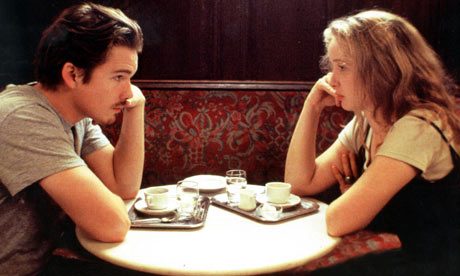The best movies are not intellectual. This is not to say that the great movies do
not have an intellectual element.
Certainly they do. The very best
films stimulate thinking and conversation.
However, at times also some not so great films do the same thing.
The greatest films do not remain just in the mind, however,
but in the soul. It stirs your emotions:
inspiring awe or anger; inciting romance or rage; stirring tears or
trembling. There is much to consider,
but it is also an experience in and of itself.
It puts you in another person’s shoes and, for a moment, allows you to
see the world as they see it. To wear
their clothes and allow us to walk around in them, allowing others to react to
us as if we were them.
For a few moments, we experienced what it felt like to be a
soldier on D-Day in Saving Private Ryan.
We could experience the ethereal beauty of music in The Double Life of
Veronique. We could experience the dread
of the supernatural evil in The Exorcist. We could sense the awe of the desert world in
Lawrence of Arabia. We could feel the rage building up in us in Malcolm X. (Sorry if you didn’t experience those
particular feelings when watching those films.
Consumer response may vary.)
Certainly two films this year comes close to that: Gravity,
that allows us to float with the astronauts and 12 Years a Slave that give us
the barest taste of what it meant to be a slave, if we were not born a slave.
There is much in this film to intellectualize,
certainly. Systemic injustice and how it
touches everything in society. How the
black was assumed to be property without proof.
The differentiation of treatment between white and black and how that
still affects American society. The use
of religion and Scripture in unjust institutions. Smaller themes—just pay for one’s work, the
loss of name as dehumanization, just and unjust use of violence—abound. All of these could be discussed forever.
But what I was constantly wondering was how much the
director identified with this story.
Steve McQueen—despite the connection in name with the white American
movie star—is a black British artistic director. I wonder if he picked this story because if
he were born at a different time, this might be his story. It might be him, having woke up with chains,
told he was a runaway slave and given a new name, beaten until he accepts his
new life.
The fact is, if I were born a different color in a different
time, this could be me. Being
articulate, being educated, having a northern accent and even being born free
didn’t help Solomon. In a time of
prejudice, it takes very little to be on the other side of the tracks. One dramatic change, and you are no longer
well regarded, you are no longer loved.
You become the outcast, the very bottom rung of society, no matter what
you did, no matter who you are. So much
depends on the story society tells about you.
I trembled as I watched this film. Not just at the atrocities Solomon and his
fellow slaves had to suffer. But at the
fact that so few did so little as to change this societal abomination. That the promoters of this evil used the very
same words I do on a daily basis to teach people how to love and care. I wept at Solomon’s experience.
Just as the credits rolled, my phone rang. Don’t worry, I had it silenced through the
film, but I decided to walk out and take the call. On a Saturday, I would normally be leading a
day shelter and worship service for some fifty homeless people, but once a
month I get a day off, which I occasionally use to watch a film I am highly
anticipating. My day shelter leader, who
used to be homeless herself, asked me about getting gear for Greg. The police came and took everything he owned
except what was on his back. We didn’t
have a tent, but we made arrangements to get him a tarp, a sleeping bag and a
leather coat.
Today, more than ever, anyone could be at the bottom rung of
society. Anyone. Suddenly, without warning, one could be
thrust onto the street and become a criminal, an object of public scorn. And the only way to get past this gauntlet of
shame is to clamber up the myriad of obstacles to become middle class
again. The longer one remains on the
street, the deeper the pit of shit one sinks into.
Who will help stop this societal injustice? Since I see it, whoever else will, I must participate in this
evil’s demise. If only because I see it for what it is.










